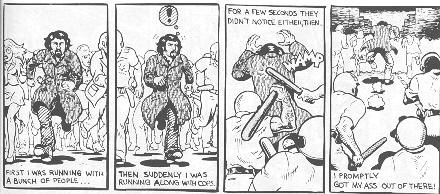|
GENRES:
Autobiography; biography; history
AUDIENCE:
Adults, older teens; graphic sex, language, drug use, gang violence
SYNOPSIS:
This book is a collection of comics, drawn between 1974 and 1994,
from one of underground comics' most notable names. It's divided
into two sections. The first, "Memory," consists of
10 incidents from Spain's life. The second, "History,"
has short pieces about interesting historical incidents ranging
in era from the Franco-Prussian War to Rome in 1977, mostly focusing
on freedom-fighting and communism.
Sample stories:
Memory:
- "Dessert": In the 1950s, Spain and his friends
give blow jobs to a homosexual man in the park, hoping to get
money out of him. When the man turns out not to have anything,
they beat him up and take his clothes.
- "Hard-Ass Friday Nite": A member of the notorious
Road Vultures motorcycle gang, Spain rumbles with them, visits
various bars looking for trouble, and generally acts disreputable.
- "Chicago '68": Sent to cover the Democratic National
Convention for the East Village Other, Spain experiences
all the charming police action supplied by the city of Chicago,
including nightstick-wielding cops who beat up everything that
moves, helicopters flying just above the treetops in the park,
and tear gas.
- "My True Story," a Robert Crumb-like personal flagellation
about how Spain has treated women.
History:
- "1871": After the disastrous Franco-Prussian war,
the dissatisfied Parisian citizenry revolt and attempt to start
a commune, only to see their experiment collapse when loyalist
forces defeat and massacre them.
- "Durruti" is the story of Buenaventura Durruti,
an anarchist, freedom-fighter, and gang leader in Spain who was
killed in 1936, fighting the fascists.
- "The Blue Boot": An old man in besieged Leningrad
makes a horrifying discovery after his young daughter disappears
while shopping in the "Thieves' Market."
- "Lily Litvak, the Rose of Stalingrad": Lily was
a female pilot employed by the Russian army to fly fighter planes
to the combat pilots. Lily insists on becoming a fighter pilot.
Alexi Salomaten agrees and makes her his wingman. She proves
skillful, and as the two work together they fall in love, but
their relationship is cruelly cut short when Alexi is killed
in a training battle. She continues to fight, ultimately shooting
down 12 Nazi planes before being shot down herself.
- "Stalin" is a biography of that evil dictator.
- "Gotterdamerung" concerns the last days of the
Third Reich and the invasion of Berlin by the Russians.
An epilogue, "Mexico and Me," provides a pocket
biography of Spain and his exploration of his Spanish roots (his
father was from Spain and his mother was from Italy). It focuses
on his excursion to Mexico in the mid-80s, his musings on the
brutal way the Spaniards treated the natives in that area, and
the stunning 3-D art produced by the Mexicans.
EVALUATION:
Spain is one of the legendary names from the comix period, but
I'm not sure this book is the best introduction to him. While
this material is always interesting and Spain's art is rough,
complicated, and exciting (classic underground style), the narratives
are often incomplete (sometimes frustratingly so) or even incoherent,
which is a shame because some of these pieces cover historical
tidbits that are little known in the United States. But important
details, like exactly what Durruti did besides assassinate a
few people, or the significance of the two French soldiers who
drift through "1871," are simply not provided. "1871"
and "Blood and Sky," another piece about the Spanish
Civil War from the point of view of the Republicans, seem like
two series of unrelated incidents, not coherent accounts of anything.
Similarly, the various Road Vulture pieces are more or less the
same, with thugs running around being thuggish to no particular
purpose--though the details in these stories, such as the guy
who yells bad poetry during fights, or the wonderful sets of
sound effects for the motorcycles, make up for a lot. And things
like "Chicago '68," "Stalin," "Lily
Litvak," and "Mexico and Me" are adequately coherent
and quite informative and entertaining. One wishes that Spain
(and, frankly, a lot of other independent comics artist/writers)
had had a good story editor to keep him on track all the time.

|
|
When Spain is linear and coherent,
he's got an excellent sense of sequential narrative, as can be
seen in these four panels from "Chicago '68" |
|
Copyright 1994, Spain Rodriguez |
My True Story would be best appreciated by older readers
who have a fondness for the comix years. Given the book's numerous
adult-level panels, kids and most teens wouldn't have too much
access to it anyway, though I'd bet that male teens would get
a kick out of the frank and cheerful depictions of motorcycle
gangs, violence, swearing, sex, and alcohol/drug use. Also, be
warned: I read this book a few times, and the entire cover came
off cleanly. Dunno if it was just my copy or an old copy or what,
but I have many, many older books, and their covers haven't
fallen off. |


